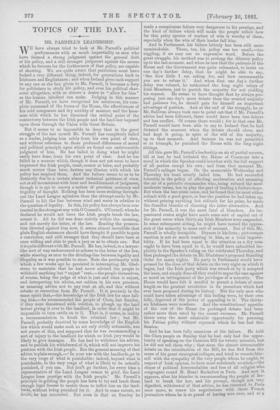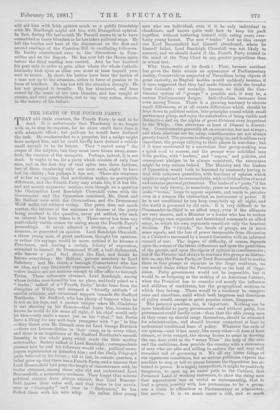TOPICS OF THE DAY.
MR. PARNELL'S LEADERSHIP.
WE have always tried to look at Mr. Parnell's political performances with as much impartiality as men who have formed a strong judgment against the general drift of his policy, and a still stronger judgment against the means which he favours for the furtherance of that policy, are capable of showing. We are quite aware that patriotism must have looked a very different thing, indeed, for generations back to Irishmen and Englishmen ; and when Ireland gives such support to any one as she has given to Mr. Parnell, it becomes a duty for politicians to study his policy, and even his political char- acter altogether, with as sincere a desire to " allow for bias" as the human intellect can make. Judging in this manner of Mr. Parnell, we have recognised his astuteness, his com- plete command of the forms of the House, the effectiveness of his cold composure and dry acridity of manner, and the keen- ness with which he has discerned the critical point of the controversy between the Irish people and the land-law imposed upon them through the Union with Great Britain.
But it seems to us impossible to deny that in the great struggle of the last month Mr. Parnell has completely failed as a leader, judging him solely from his own point of view, and without reference to .those profound differences of moral and political principle upon which we found our unfavourable judgment of him. He has failed in doing what he might easily have done, from his own point of view. And he has failed in a manner which, though it does not yet seem to have impressed the Irish people, must, sooner or later, and probably much sooner than later, destroy any illusion with which his policy has inspired them. And the failure seems to us to be distinctly due to a certain almost technical pettiness of view, not at all inconsistent with heat and bewilderment of judgment, though it is apt to convey a notion of precision accuracy and frigidity of thought. Nothing has been more striking through- out the Land League agitation than the attempt made by Mr. Parnell to hit the line between wind and water in relation to the question of legality. In this, his policy has always been con- trasted in the strongest way with O'Connell'e. O'Connell, when he declared he would not have the Irish people break the law, meant it. All he did was done strictly within the meaning, and not merely the letter, of the law. Reading the prosecu- tion directed against him now, it seems almost incredible that plain English statesmen should have thought it possible to gain a conviction, and still stranger that they should have been at once willing and able to pack a jury so as to obtain one. But itis quite different with Mr. Parnell. He has, indeed, in a lawyer- like sort of way endeavoured to adhere to the letter of the law, while steering as near to the dividing-line between legality and illegality as it was possible to steer. Note the pertinacity with which a few weeks ago he persisted in interrupting Mr. Glad- stone to maintain that he had never advised the people to withhold anything but " unjust " rent,—the people themselves, of course, being the judge of what is just and what is unjust, and interpreting his advice, not seldom in his own presence, as meaning advice not to pay rent at all, and this without rebuke or correction from Mr. Parnell. It is precisely in the same spirit that,—his knowledge of the Irish law for once fail- ing him,—he recommended the people of Clara last Sunday, if they were threatened with eviction, to plough, up the land before giving it over to the landlord, in order that it might be impossible to turn cattle on to it. That is, it seems, in reality a recommendation to break the criminal law ; but Mr. Parnell, probably deceived by some knowledge of the English law which would make such an act only civilly actionable, was not amuse of this, and supposed that he was recommending a sort of injury to the landlord for which no Irish jury would be likely to give damages. He has had to withdraw his advice, and to publish his withdrawal of it, which will not improve his position with the Irish people. But the general meaning of that advice is plain enough,..-.' In your war with the landlords, go to the very verge of what is punishable ; indeed, beyond what is punishable, to the very verge of what is likely to be actually punished, if you can. But don't go further, for every time a representative of the Land League comes to grief, the Land League loses prestige with the Irish people.' Mr. Parnell's principle in guiding the people has been to try and teach them enough legal finesse to enable them to inflict loss on the land- lords, without being punished for it. 4"ld to some extent, no doubt, he has eucceeded. But even in and cnSueday ho
made a conspicuous failure very dangerous to his prestige, and the kind of failure which will make the people reflect how far this petty species of warfare of wits is worthy of them, especially when the wits of their leader fail him.
And in Parliament, his failure latterly has been still more unmistakable. There, too, his policy was too small,—too• niggling, if we may use an expressive word. Before the- groat struggle, his method was to prolong the dilatory policy up to the last moment, and when he saw that the patience of the. House and the Government was quite exhausted, to insist on one day's further delay, that he might be able to say, See how little I am asking for, and how unreasonable you are to refuse it.' And when that one day's further delay was refused, he authorised the long night relays of Irish Members, just to punish the majority for not yielding his request. He seems to have thought that by always pro- posing just one day's more debate than the wearied majority. had patience for, he should gain for himself an important advantage of position. And at the end of the struggle, he or Mr. Sullivan always took care to point out that if Mr. Parnell's.
advice had been followed, there would have been less debate and less conflict. Of course there would ; for in that case Mr._ Parnell would have been able to say to Ireland that he had dictated the moment when the debate should close, and had kept it going, in spite of the will of the majority,. up to that moment. And because he was not permitted so to triumph, he punished the House with the long night sittings.
All this gave Mr. Parnell's leadership an air of partial success, till at last he had irritated the House of Commons into a mood in which the Speaker could interfere with the full support of all parties except his own ; and from that moment Mr. Parnell's collapse began. On the memorable Wednesday and, Thursday his head utterly failed him. He had succeeded tolerably in the policy of affecting moderation and assuming the air of a patriotic commander who, being refused the most moderate terms, has to play the part of leading a forlorn-hope. But when the last crisis came, and he found that he must either- submit with a good grace, or lose the position he had taken up, without gaining anything but ridicule for his pains, he made the dreadful blunder of choosing the latter alternative. And for Mr. Parnell, it was the most fatal of blunders. An im- passioned orator might have made some sort of capital out of the great scene when thirty-six Irish Members were suspended. In some subsequent sitting, he might have turned the oppres- sion of the minority to some sort of account. But of this, Mr.
Parnell is wholly incapable. Dryness is his forte ; picturesque emotion is not so much wanting to him, as a total impossi- bility. If he had been equal to the situation as a dry man ought to have been equal to it, he would have submitted im- plicitly to the Speaker's ruling on the celebrated Thursday, and then prolonged the debate on Mr. Gladstone's proposed Standing Order for many nights. No party in Parliament would have pressed for the close of that debate on the very night on which it began, had the Irish party which was struck-at by it accepted the issue, and simply done all they could to argue the case against so novel an infringement of the privileges of a minority. The House would have felt it needful to permit a debate of some length on the greatest revolution in its procedure which had ever been proposed during its history. But the only men who could have taken advantage of this feeling were, by their own folly, deprived of the power of appealing to it, The thirty- six Irishmen were nowhere. And the constitutional appetite of the rest of the House for prolonged debate had. been rather more than sated by the recent excesses. Mr. Parnell threw away the most admirable opportunity for pursuing his Fabian policy without reproach which he has had this Session.
And he has been fully conscious of his failure. He told the Clara people on Sunday that he had only had the oppor- tunity of speaking on the Coercion Bill for twenty minutes, but he did not tell them why ; that since the almost interminable debate on the introduction of the Bill, he has fled front the
scene of his great strategical collapse, and tried to console him- self with the sympathy of the very people whom he ought, in respect of Irish opinion, to have most sedulously avoided,—the clique of political Irreconcilables and foes of all religion who, congregate round M. Henri Rochefort in Paris. And now appears, after his blunder in recommending the people of Ire- land to break the law, and his prompt, though not very dignified, withdrawal of that advice, he has returned to Paris once more, to renew his negotiations with those French journalists whom he is so proud of having won over, and wl
will aid him with Irish opinion much as a public friendship with Mr. Bradlaugh might aid him with Evangelical opinion. In fact, during the last month Mr. Parnell seems to us to have committed as many blunders as he has taken political steps. He left the burden and heat of the discussions on the first and second readings of the Coercion 13111 to vacillating followers. He hardly contributed even to the discussions in Com- mittee and on the Report. He has now left the House again before the third reading was carried. And he has deserted his post only in order to gain allies whom the whole Catholic hierarchy look upon as allies you must at least imperil your soul to secure. In short, his tactics have been the tactics of a man not up to the situation, either in force of passion or in force of intellect. He has not felt the situation strongly. Ho has not grasped it broadly. He has blundered, and been cowed by the sense of his own blunder, and has caught at straws, and very unattractive, not to say very rotten, straws, in the misery of his failure.



































 Previous page
Previous page